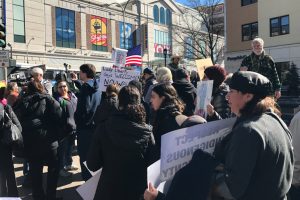Westchester legislators consider Immigration Protection Act
The Westchester County Board of Legislators is considering legislation aimed at protecting immigrants who call Westchester their home.
“I think we probably all know that at the federal level, given President Trump”™s executive orders, there”™s just been a ripple effect in Westchester,” said Legislator Catherine Parker, a Rye Democrat. “A lot of people are feeling very anxious.”
Introduced by the board”™s Democratic caucus in February, the Immigration Protection Act prevents Westchester County from using any of its resources to assist in federal investigations based on race, gender, sexual orientation, religion, ethnicity or national origin.
“Checking on the immigration status of Westchester County residents is not a local responsibility and we will not use our resources to further a policy which instills fear in so many of our neighbors,” Majority Leader Catherine Borgia, an Ossining Democrat, said in a statement.

Supporters of a proposed county immigration protection law rallied in downtown White Plains in February.
The act also safeguards confidential information shared with county departments and prohibits officers from honoring U.S. Immigration and Customs Enforcement (ICE) requests that lack probable cause. The proposed legislation also ensures that services provided by the county will be available to all who are eligible, notwithstanding their immigration status, and protects Westchester County from liability due to false arrests and imprisonments.
Parker said that community members, both documented and undocumented, are often afraid to call the police and the Immigration Protection Act aims to alleviate some of their fears. Democratic legislators believe the act will ensure the fair treatment of immigrants by the justice system and allow them to feel more confident in working with law enforcement.
The act follows a model laid out by state Attorney General Eric Schneiderman aimed at protecting immigrant communities. The model provisions clarify that local law enforcement can limit their participation in federal immigration enforcement activities in several ways: by refusing to enforce federal nonjudicial civil immigration warrants; by denying federal requests to hold uncharged individuals in custody more than 48 hours; by limiting access of federal agents to individuals currently in custody; and by limiting information-gathering that will be used exclusively for federal immigration enforcement.
The Immigration Protection Act also codifies an executive order issued by former Democratic County Executive Andrew Spano in 2006, which put a system in place regarding immigration enforcement. Joseph Sgammato, press secretary for the board”™s Democratic caucus, said legislators have heard conflicting reports from the county executive”™s office and immigration attorneys as to whether that executive order is still followed by the county.
“That”™s part of our basis for this law,” Sgammato said. “We want to make sure there”™s no question about it.”
Requests for comment from the office of County Executive Robert P. Astorino were not returned at press time.
A series of rallies have been held in support of the proposed legislation since its introduction, including a peaceful protest in White Plains on Presidents’ Day last month.
“I think what we really wanted to do is stand up for all our residents of Westchester County and this is the way we feel that we can do that,” Parker said. “Westchester has a long tradition of being very tolerable, very inclusive, and we really want to make sure that we”™re standing up for our citizens and representing those values.”
In conjunction with the act, a number of Westchester communities have taken action to reaffirm their stances in light of what many believe to be increased challenges faced by ethnic and religious minorities following executive orders issued by President Trump.
In February, the Irvington Village Board of Trustees adopted a policy similar to the Immigration Protection Act, stating that its law enforcement officials should not engage in activities solely for the purpose of enforcing federal immigration laws. Other Westchester municipalities, including Croton-on-Hudson, Ossining and Peekskill, have confirmed their commitment to being “inclusive” communities, welcoming all residents regardless of ethnicity or country of origin.
The Immigration Protection Act is under review by the Board of Legislators committees on budget and appropriations, legislation and public safety. Sgammato said dates for those committees”™ reviews have not yet been set. If passed by the committees, the act would require the approval of nine of the 17 members of the board.
“The goal is to make it an act all legislators will be able to vote for,” said Minority Leader John Testa, a Peekskill Republican. “It will take some time to reach a final version.”
“We worked very hard to make sure that this is constitutionally sound, and it is,” Parker said. “It will stand that test.”
However, board Democrats anticipate that Astorino will veto the legislation if it passes. To override his veto, the bill would need the approval of 12 board members.
The county Board of Legislators currently is comprised of nine Democrats, seven Republicans and one Conservative.